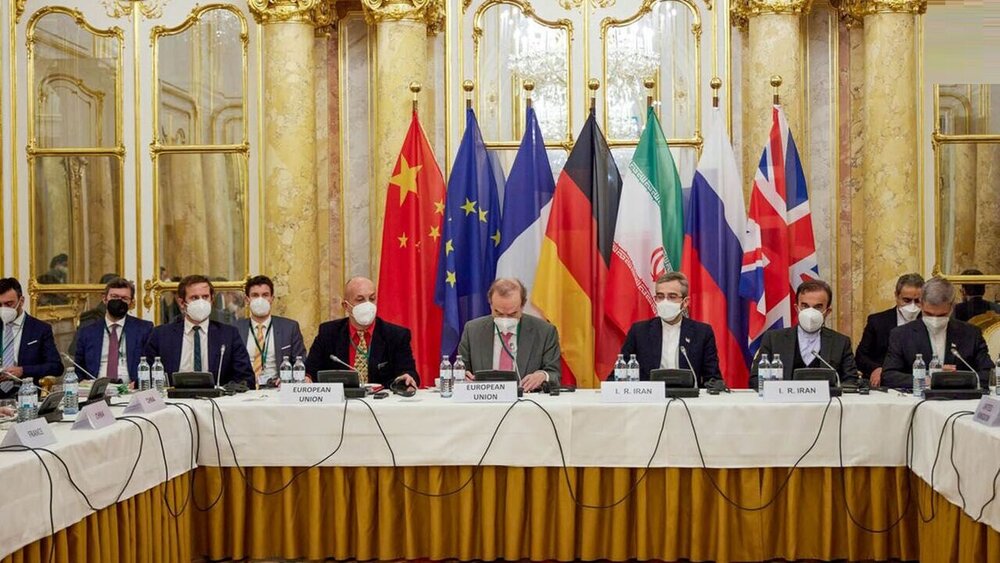Raisi administration reined in Western excessive demands: MP

TEHRAN – An Iranian lawmaker has praised the Raisi administration’s policy toward the nuclear talks with the West, saying that the administration succeeded in containing the West’s excessive demands.
Qudratullah Hamzeh Shalamzari said, “The 13th government had favorable and acceptable activities in the field of foreign policy to remove the sanctions and seriously defended the rights of the people.”
He added, “In the previous government, European and American countries usually put forward proposals in the field of nuclear negotiations, and Iran's negotiating team responded to them by examining them. But with the formation of the 13th government, this procedure changed, and Iran presents its proposals and plans, and the Western side must respond.”
The lawmaker made the remarks in an interview with Iran’s state news agency IRNA.
Stating that the Raisi government defended the interests of the Iranian nation with intelligence and authority at the negotiation table to lift the sanctions, Hamzeh Shalamzari said, “From the beginning, the priority of the government has been to preserve the dignity and authority of the country, and with seriousness in economic diplomacy and relations with the world and the region, it has brought changes in favor of Iran at the regional and global level.”
He continued, “The 13th government modified the conventional procedures of the previous government based on the bitter experience of the JCPOA, did not tie the economy and livelihood of the people to the JCPOA, and curbed the excessive demands of the West by drawing up a policy of complete removal of sanctions.”
He noted, “Respecting the red lines, protecting the interests of the people and protecting the absolute rights of the people brought honor and authority to Islamic Iran.”
The lawmaker continued, “The Islamic Republic has never left the negotiation table, it was the Westerners who created a crisis in the negotiations by issuing a resolution in the Board of Governors of the International Atomic Energy Agency. Now it seems that we are close to an agreement.”
He added, “The negotiating team moved within the framework of the general policies of the establishment, and the important recommendations of the Leader of the Revolution were also considered by them, and they left an acceptable track record.”
Referring to the parliamentary strategic ratification to annul sanctions, he said, “Passing this law facilitated the work of the negotiators and provided good support to the negotiating team. This law armed the negotiation team against the enemy. The actions and coordination of the government and the Majlis (Parliament) made the negotiating team come to the negotiating table with more strength in this round of talks.”
After intensive meetings and consultations, Iran finally submitted its response to the text the European Union submitted to Iran and called it a “final” draft.
The Iranian answer to the EU draft came amid Iranian calls for the U.S. to show flexibility. The Iranian foreign minister has said that Iran showed much flexibility and America knows that full well. “America knows very well how much flexibility we have shown, now it is the turn of the American side to be flexible. In the recent Vienna negotiations, the American side expressed its verbal flexibility on two issues. This should be in writing. In the third issue and guarantees, we must have America's flexibility. If America shows flexibility, we will reach a point of agreement in the coming days,” he stated.
After submitting the response, Iran continued its internal consultations. The Supreme National Security Council hosted a meeting of the members of Parliament’s National Security and Foreign Policy Committee on Tuesday. Ali Shamkhani, Amir Abdollahian, and Ali Bagheri Kani attended the meeting. And on Wednesday, a closed session of Parliament was held with the same officials to discuss the situation around the talks in Vienna over reviving the 2015 nuclear deal, officially known as the Joint Comprehensive Plan of Action (JCPOA).
Abbas Moqtadaei, who is a member of Parliament’s National Security and Foreign Policy Committee, has provided some details about the Iranian response to the text submitted by the European Union on reviving the 2015 nuclear deal.
Moqtadaei confirmed this point after MPs sitting on the Parliament National Security and Foreign Policy Committee held a three-hour meeting on Tuesday with SNSC Secretary Ali Shamkhani, Amir Abdollahian, Bagheri Kani and chief of the Atomic Energy Organization of Iran (AEOI).
“The meeting was attended by the secretary of the (Supreme) National Security Council, and it was of great importance, because in the meeting held today (Tuesday), we studied Iranian views and visions, and a view was formed in order for the Council to be informed of the latest developments in this matter,” the lawmaker said in an interview with Al Alam.
Moqtadaei stressed that the Parliament approved the strategic law on the rights of the Iranian people, and as it is known, it was America that withdrew from the nuclear agreement.
He noted that Iran had presented its response to the other side and stressed that its rights and guarantees should be taken into account.
Moqtadaei noted that it was premature to talk about the details of the Iranian response that was submitted to the European Union.
“In our response, we emphasized that the opposing party must meet Iran's demands and the rights of the Iranian people,” he said.
Leave a Comment